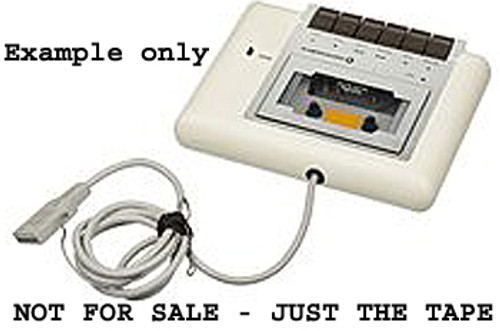No, it is not a music cassette, even though there are bands with similar names such as Short Fuse and The Short Fuses ...
This is a very retro 1980's DATA cassette for loading into your Amstrad home PC (doesn't everyone have one of these?) and playing a "hot" 80's game (well, some might say the game is a bit "limp", many were in those days)
AMSTRAD 454/664/6128 - Short's Fuse
Barcode (rear) 5 012439 000426
Firebird Software (UK)
CPC format (Amstrad)
Game Title: SHORT'S FUSE
Suits use with only the Amstrad 454/664 or 6128 game machines
Using the compact cassette media, games are loaded into the Amstrad videogame machine (be patient though!)
COSMETIC CONDITION:
USED
Clean
Cassette and case are in very good condition
Visual inspection of the tape shows no signs of abuse (crinkling etc)
Pressure pad is fine (these fall off over time)
TESTING:
I no longer have any of my retro machines, they found a new home long ago but all is not lost.
How do these data cassettes work?
Program data was converted by the cassette based game maker into audio tones, the system is known as FSK (Frequency Shift Keying) so instead of a 010101 stream of data, there was a string of tones recorded on the audio cassettes. There was nothing special about these cassettes other than the content.
This means that even without a machine to load the program into, it is possible to make some basic tests to check the health of the game cassette.
First up, I checked the front pressure pad - this is often the cause of issues in old cassette tapes - all good here.
Next, I ran the cassette through one of my audio cassette machines to ensure the tape path was clear, no tape bearing issues (squeeks etc) and no tape stopping or hesitancy to move smoothly. Everything was good here ...
Next, although of course I cannot decode the data stream I can listen to it - it sounds something like the old analog modems that we used to have for connection via fixed lines for internet services.
Here is an example of that sound which has been put up online by another person (mind numbing isn't it?)
I "played" the cassette, boring as that was, (and a bit tough on the ears although probably preferred over some of the experimental music I listen to from time to time!) and yes there is plenty of FSK tones being generated from the tape - great! Actually the sequence is always a High (tone) of a few seconds (telling the computer "Hey! get ready because I am about to send you a bunch of data big fella!) and then a burst of the data stream. Short pause and then the process repeats again ... and on it goes. That initial continuous high tone is actually quite handy as it serves as a type of "test tone" and you can easily tell if the tape speed is varying because the tone frequency would change as well.
I am happy this tape is performing exactly as it should and it only needs to be loaded into your "whizz bang" super ubeaut Amstrad home PC and you should be in business!











